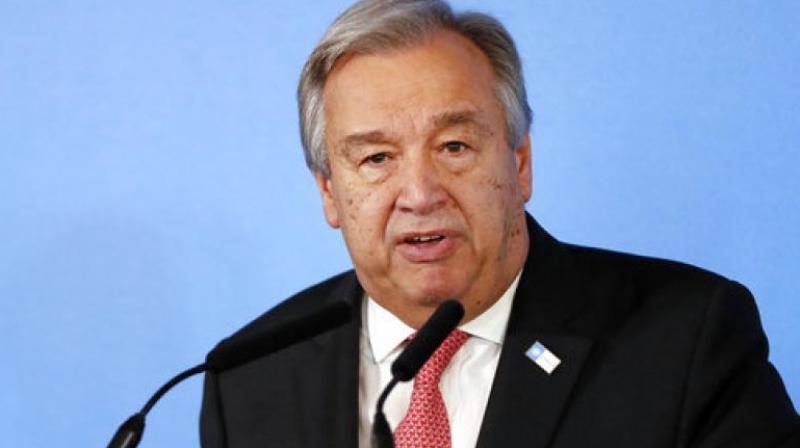Communalism no issue in India, says Antonio Guterres

New Delhi: In what seems a a major boost for New Delhi, visiting United Nations Secretary General Antonio Guterres on Tuesday said India does not face a “major problem” with communalism and religious fundamentalism, adding that he sees the country as one with “extreme diversity”. Responding to a question on communalism and religious fundamentalism, the UN Secretary General was quoted by news agencies as saying that he “does not think India is in the worst situation” at all. “I have always seen India as a country with extreme diversity. Of course, there are forms of extremism as any other parts of the world. I don’t think that is the major problem that you face,” Mr Guterres was quoted by news agencies as saying.
According to TV and website reports, Mr Guterres was also quoted as saying, “I don’t think India faces a communalism problem. I see the extraordinary diversity in India. I have seen perfect religious harmony in India.” Mr Guterres also said India can help in resolution of the Rohingya refugee crisis by supporting Bangladesh in humanitarian assistance and using its influence with Myanmar to bring about reconciliation. On the Rohingya crisis (in Myanmar), he also said that to keep a population (Rohingyas) in such a “discriminatory situation” is “an invitation for terrorist groups” to exploit the situation.
Mr Guterres, in an interaction with a news agency, also denounced terrorism as a “plague” that affects the world, and highlighted the significance of the principle of non-violence espoused by Mahatma Gandhi. To a question on the UN Office of the High Commissioner for Human (OHCHR) Rights report on alleged human rights abuses in Kashmir in June this year which was rejected by India, he said the reports are not endorsed by the secretary general. “I don’t discuss reports about human rights commissioner. They have independence. The countries can agree or disagree with the reports. Their reports are not endorsed by the secretary general. The reports are done in a strictly independent way.”
Mr. Guterres also met Prime Minister Narendra Modi on Tuesday afternoon in New Delhi, during which issues such as climate change, reforms in the UN Security Council and India’s contributions to UN peacekeeping was discussed, officials said. There were no specific reference by officials to any discussions on the Kashmir issue amid speculation earlier that the UN chief may raise the issue.
“PM @narendramodi and @UN Secretary General @antonioguterres exchanged views on India’s leading role at the #UnitedNations in Climate Change, SDGs, Digital Cooperation, UNSC reforms and Peacekeeping, among others,” MEA Spokesperson Raveesh Kumar tweeted on Tuesday.
Praising PM Modi, the UN chief said, “Some 2.3 billion people worldwide do not have the basic sanitation facilities. To build resilient, healthy societies, we need to change this urgently. I congratulate @narendramodi for demonstrating leadership and vision on this vital issue.” The UN chief also said India “is an absolutely essential component” of a future multi-polar world and that the country can also play a role of an “honest broker” in some of the on-going conflicts in the world.
Responding to a question on why the Comprehensive Convention on International Terrorism (CCIT) could not be adopted, Mr. Guterres said, “The problem of definition of terrorism is (due to) several complexities. There are number of things which are complicated to have a common definition of terrorism. We have never managed to have it and we have never managed to have a true convention because of the definition.”

